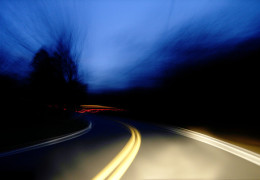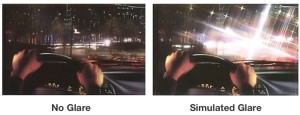Driving In The Dark, How Well Can You See?
The clocks will go back 1 hour on Sunday 27th October and the long winter nights are drawing in and we would like to highlight some simple steps you can take to ensure that you see as well as possible while driving your car.
Millions of British drivers admit that they find it harder to see clearly when driving after dark and it’s a fact that more road accidents occur at night than during the day.
Common night driving problems include blurred vision, difficulty focusing and dazzle or flare. Low light levels at night cause the pupil of the eye to become larger and this can accentuate any focusing errors – no matter how minor – causing blur.
At night it’s therefore more important than ever to wear a pair of spectacles or contact lenses with an up-to-date prescription. For many people haloes and reflections around lights and headlamps can make their eyes feel uncomfortable while driving. The most common cause is a dirty windscreen (often on the inside as well as the outside) or worn-out wiper blades, although scratched or dirty spectacles can be just as bad.
Also, reflections from the surface of spectacle lenses can sometimes cause multiple images of lights at night. If you notice these, effective anti-reflection lens coatings are available.
Older people often find night driving particularly stressful. With increasing age, the lens of the eye tends to yellow, reducing vision clarity, but major discomfort from glare can be caused by cataracts – a clouding of the eye lens which requires specialist treatment.
If you are affected by oncoming headlights, try concentrating on the nearside kerb as you drive – but remember to slow down!
- Never wear dark or tinted lenses for night driving
- Keep a clear view on the road at night
- Make sure you have regular eye examinations
- Always wear a pair of glasses or contact lenses with an up-to-date prescription
- Keep a spare pair of glasses in the car if possible
- Don’t use tinted lenses, but have them anti-reflection coated if necessary
- Keep your windscreen clean inside and out and check your wiper blades for wear
- Check your car’s lights are working


